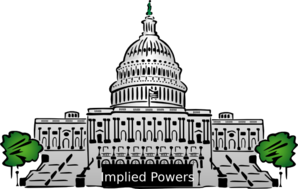Most people believe it was the intent of the founders that the Federal Government would have a defined set of powers delegated by the constitution and all other powers necessary for governing would be reserved to the State Governments. A single quote from the Federalist papers is enough to support that view. Madison #45 “The powers delegated by the proposed Constitution to the Federal Government, are few and defined. Those which are to remain in the State Governments are numerous and indefinite.”
Nevertheless the states were very concerned that over time their sovereignty would be eroded by the Federal Government. This fear sprang mostly from the ambiguous wording in the constitution including terms like “to promote the general welfare” and “to make all laws which shall be necessary and proper for carrying into Execution the foregoing Powers, and all other Powers vested by this Constitution in the Government of the United States”.
For this reason the states insisted when they ratified the constitution that an amendment be added protecting their sovereignty. That amendment of course is the tenth amendment that reads, The powers not delegated to the United States by the Constitution, nor prohibited by it to the States, are reserved to the States respectively, or to the people.
One thing missing however is who decides if a particular power is delegated to the United States or not. It would have been easy to add a few words to the the tenth amendment giving the power of decision to the states or removing it from the states. But they didn’t add anything leaving the decision maker undefined.
Clearly the states must have thought they had an implied power to judge if the power exercised by the Federal Government has been delegated to the United States or they would not have ratified the constitution. But what exactly was that power?
There was an attempt to add the word “expressly” to the amendment before the word “delegated”, but that was defeated in congress with help from Madison. So apparently there really was no desire to restrict the powers delegated to the United States to those expressly delegated. Therefore the United States also has implied powers that are required to implement the powers given in the constitution and they were not listed. This would suggest that whenever the states attempted to exercise their power it was going to be subject to argument. As we are now all too aware, the federal implied powers coupled with the ambiguous language opened the doors to federal usurpation of powers not delegated as the states feared.
Returning to the amendment and what form the implied power will take, the amendment does not say “are reserved to each state respectively” instead “states” is plural in every use. Madison in Federalist #44 is against each state making its own decisions thinking a federal system of government could not function if each of the members could decide which laws to follow and which to ignore. I have to agree.
Also Madison in his Report of 1800 on the Virginia Resolutions, explicitly tell us that the word “states” in the tenth amendment means the people of the states and not the state legislatures. So whatever power is implied it is reserved to the people. And what power do the people have in the constitution? Voting power. Vote the rascals out that are taking our liberties. But voting power is already granted by the body of the constitution so it is clearly not added by the tenth amendment although voting could be part of the exercise of this implied power to decide.
Hamilton informed us of another power that the states collectively had to prevent the Federal Government from assuming powers not delegated. Military power, yup, fight the Federal Government on the field of battle. He made a pretty good case for it in Federalist #28. First the states were concerned about a federal standing army in time of peace so the constitution required that the army be re-authorized every two years. Second the state militias in the combined states had considerably more manpower than the federal standing army and the militia were armed with the same weapons. The final advantage to the states was that of geography, that is, the vast extent of the union over which the federal army would have to engage.
Reading Federalist #28 it appears that Hamilton thought so much of military power that one wonders if this was actually the power that the states relied upon and therefore they were not too concerned about implied powers. Using military power is a little out of date now given the existing difference in fire power so if this was the relied upon method, we have a problem..
So I ask is there today an implied power granted by the tenth amendment or any other founding document allowing the states to decide if the powers assumed in federal laws are delegated? The Supreme Court says no but many states say yes. The implied power in the tenth amendment that the states claim applies to individual states, is not subject to question or review, and is in the hands of the legislature and not the hands of the people, exactly the opposite from the principles laid down by the founders mentioned above.
That is the trouble with the implied powers in the constitution. Even after two centuries we don’t really know the answer to whether this power exists and in what form it should take. But we need to find a method to stop the Federal Government from the further expansion of its powers that have reached well beyond anything imagined by our founders. Our liberty is in jeopardy and our response is required.
















